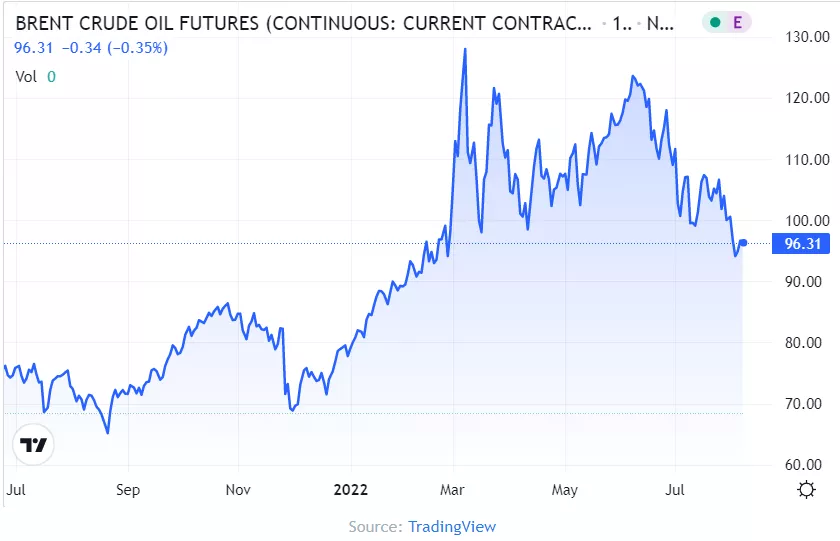Nasdaq Dragged Down In Bad Day For Chip And Tech Stocks
After several months of stubbornly high prices, crude oil has struggled recently. In the first week of August, important benchmarks WTI and Brent dropped by 9.74% and 13.72% respectively, with both currently hovering around their lowest levels since February.
The recent decline comes amidst concerns of an impending global recession after the US recorded its second consecutive quarter of negative growth and the Bank of England forecast that the UK will enter recession by next year.
Oil enjoys a strong positive correlation with economic growth, meaning that when economies contract, oil prices tend to fall along with them. Hence, we are likely to see this fear of recession continue to weigh on oil prices in the coming months.

As highlighted in yesterday’s news, the release of US inflation data this afternoon is likely to define how the financial markets behave in the coming sessions. Inflation in the 12 months leading up to July is expected to come in at 8.7%, which would represent a decline from June’s figure of 9.1%.
This would certainly go down well at the Federal Reserve, who would take this as a sign that their tough approach to monetary policy is beginning to bear fruit. However, although a step in the right direction, 8.7% is still a long way from the Fed’s target of 2%.
If US inflation is reported worse than expected, it is likely that both stocks and commodities, with the exception of gold, will take a hit this afternoon, particularly if the number is higher than June’s figure. The exception could be safe-haven asset gold, which historically benefits from periods of economic turbulence. Remember to be prepared for increased volatility in the markets around this release.
Chipmakers Feel the Effect of Rising Costs
Yesterday, Nasdaq closed the session 1.19% lower after a bad day for chipmakers and tech stocks. Both sectors were hit after chipmaker Micron Technology slashed its revenue guidance for the current quarter on falling demand, and closed the session down by 3.74%.
This negative outlook followed Nvidia’s similar warning on Monday that Q2 revenue would drop, ahead of their earnings announcement later this month. Consequently, yesterday, the Philadelphia Semiconductor Index fell more than 4.5%, despite a new US bill being signed that will allocate $52.7 billion in subsidies for semiconductor production and research in the US.
Behind the worse outlook is the rising cost of living, which is forcing consumers to re-evaluate their spending habits. Predictably, this is causing demand for discretionary goods, such as electronic gadgets, to fall as essentials take priority.
It would not be surprising if we saw more guidance cuts from other discretionary goods and services companies in the near future, potentially starting with Walt Disney’s earnings announcement tonight once the market closes.
The Streaming Wars Heat Up
Of particular interest to many investors, this evening will be subscriber numbers for Disney+. In a year that has seen Netflix lose subscribers two quarters in a row, it will be interesting to see whether Disney+ can take advantage of this to close the gap on their rival.
If subscribers keep leaving Netflix, the streaming giant is going to feel its revenue affected at some point. Unlike Netflix, Disney is not reliant on money from its streaming service, generating several other sources of revenue outside of Disney+ (which is still a loss-making operation). These additional streams of revenue could prove pivotal in the future.
Naturally, demand for both streaming services is likely to feel the effect of rising costs at some point, and a possible recession will only make this worse. However, a downturn could also give Disney+ an opportunity to close the gap on its main competitor.
For companies that are cash-rich, a recession can be an opportunity to steal market share from competitors by scaling up investment in future growth. In Disney’s previous quarterly results, they reportedly had more than $13 billion in cash compared to Netflix’s $5.8 billion.
In the event of a downturn, we could, therefore, see Disney take advantage of their bigger war chest by becoming more aggressive with new content in an attempt to dethrone Netflix as the world’s most popular streaming service.
(Click on image to enlarge)

Depicted: Admirals MetaTrader 5 – The Walt Disney Co. Weekly Chart. Date Range: 7 February 2016 – 9 August 2022. Date Captured: 10 August 2022. Past performance is not a reliable indicator of future results.
More By This Author:
Wall Street Flat As Investors Eye Important Inflation Data
Will Eurozone Retail Sales Disappoint Amid Inflation Pressures?
Food For RBA Hawks - Australia's Inflation Hits 30-Year High



